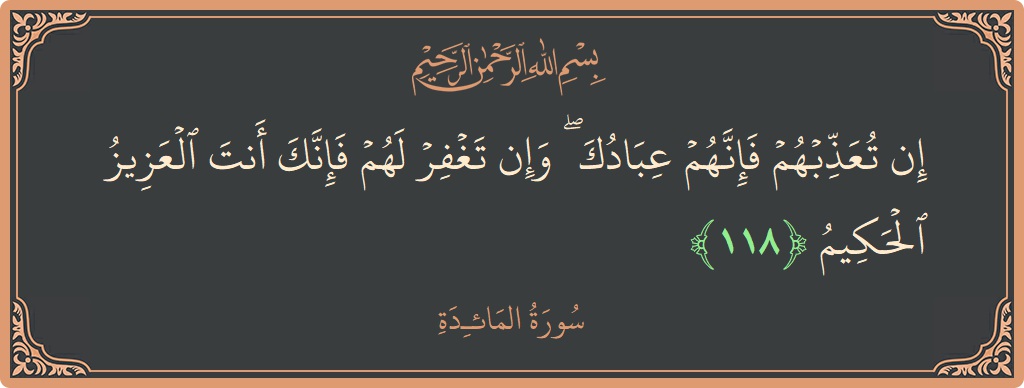Surah Al-Maaida: Verse 118 - إن تعذبهم فإنهم عبادك ۖ... - English
Tafsir of Verse 118, Surah Al-Maaida
English Translation
If You should punish them - indeed they are Your servants; but if You forgive them - indeed it is You who is the Exalted in Might, the Wise.English Transliteration
In tuAAaththibhum fainnahum AAibaduka wain taghfir lahum fainnaka anta alAAazeezu alhakeemuTafsir of Verse 118
1. As for the statement beginning with the words: إِن تُعَذِّبْهُمْ فَإِنَّهُمْ عِبَادُكَ (If You punish them, they are Your slaves ... ) appearing in the last verse (118), it means that Allah does not bring undue hardship on His servants, therefore, if punishment does come to them, it will only be just, right and wise. And should He forgive them, then, this forgiveness too will not be a matter of not being able to do otherwise - because He is Mighty, fully-capable and overpowering, from whose reach and control no wrong-doer can escape. And since He is Wise too, therefore, it is also not possible that He would let a wrong-doer walk away just for no reason. Thus, the Divine verdict in the case of wrong-doers will be absolutely wise and masterly. Since this saying of Sayyidna ` Isa (علیہ السلام) will take place in the Mahshar (the day of Resurrection) - where no intercession on behalf of the disbelievers, or appeal of mercy for them, will be entertained - therefore, Sayyidna ` Isa (علیہ السلام) has not referred to the Divine attributes of Ghafurur-Rahim (the Most-Forgiving, the Very-Merciful) in place of "Al-` Aziz Al-Hakim" (the Mighty, the Wise) of the text. This stands in contrast with what Sayyidna Ibrahim (علیہ السلام) had said to his Lord during his life in this world: رَبِّ إِنَّهُنَّ أَضْلَلْنَ كَثِيرًا مِّنَ النَّاسِ ۖ فَمَن تَبِعَنِي فَإِنَّهُ مِنِّي ۖ وَمَنْ عَصَانِي فَإِنَّكَ غَفُورٌ رَّحِيمٌ ﴿36﴾ (That is, 0 my Lord, these [ idols ] have made many of the people go astray. Henceforth, whoever has followed me is one of mine. And whoever has disobeyed me, so then, You are the Most-Forgiving, the Very-Merciful - 14:36). It means that the likelihood still exists that Allah may, in His mercy, give them the Taufiq later on to repent and return to the path of truth and thereby forgive their sins. (Shabbir Ahmad Usmani - Notes)
Ibn Kathir reports a narration from Sayyidna Abu Dharr ؓ that once the Holy Prophet ﷺ spent a whole night reciting one single verse. And that verse was: إِن تُعَذِّبْهُمْ فَإِنَّهُمْ عِبَادُكَ (If You punish them, then, they are Your slaves - 118). When morning came, I said: Ya Rasul Allah, you kept reciting just this verse. You made your Ruku` with it and you made your Sujud with it, right upto this break of dawn. He said: I prayed to my Rabb to bless me with the station of intercession (Shafa’ ah), which He granted. Inshallah, it is going to be for one who has never associated anyone with Allah Ta` ala.
According to another narration, after reciting the verse cited above, he raised his hands facing the heaven and said: اَللَّھُمَّ اُمَّتِی (Allahumma Ummati that is, ` 0 Allah, mercy - mercy on my people.' And then he wept. Thereupon, Allah Ta` ala sent angel Jibra'il (علیہ السلام) to ask why would he weep. He told the angel what he had said. Then, Allah Ta` ala asked angel Jibra'il to go back and tell Muhammad that He will please him soon in his concern for his people and will not let him be unhappy.
